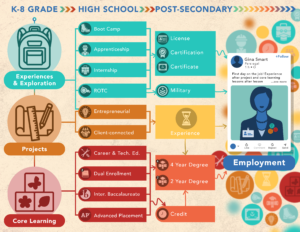Two Reports Indicate Progress on Proficiency-Based Education in New England

Graduation rates in the six New England states rose from 80% in 2009 to almost 88% in 2015 according to a new report from the Great Schools Partnership.
Great Schools Partnership is the best example of a regional education collaboration focused on competency-based learning (what they call proficiency-based) in the U.S. Including the New England Secondary School Consortium, their policy advocacy has resulted in progress in five states, and a 67-institution HigherEd consortium that accepts competency-based diplomas.
Given the regional focus on demonstrated competence, it’s likely that the improved graduation rates were also accompanied by improved college and career readiness (unlike other regions that lowered standards/expectations to get students to the finish line).
The improved academic results were reported today as part of the Common Data Project. Beginning in 2009, Connecticut, Maine, New Hampshire, Rhode Island, and Vermont have been collecting, calculating and reporting graduation rates, dropout rates and college enrollment and completion rates using consistent metrics and methods.

Regional Tipping Point
 Nonprofits CompetencyWorks and the International Association for K-12 Online Learning (iNACOL) recently published a report outlining progress in New England on K-12 competency-based education policy.
Nonprofits CompetencyWorks and the International Association for K-12 Online Learning (iNACOL) recently published a report outlining progress in New England on K-12 competency-based education policy.
Maine, New Hampshire, Rhode Island and Vermont have established comprehensive state policies that seek 100 percent of districts to offer competency-based diplomas—and Connecticut is on the way.
“On one side of the continuum is Rhode Island, with a suite of prescribed practices; on the other are Maine, Vermont, and New Hampshire, with more goal-oriented strategies supported by a variety of capacity-building activities,” said author Chris Sturgis.
States using comprehensive, high-leverage policies are doing so using the very same principles that undergird competency education in schools:
- A growth mindset that believes educators can learn with adequate supports;
- Transparency of expectations and assessments;
- Emphasizing support over compliance;
- Engaging the coalitions of the willing as partners;
- Informing policy with local innovation; and
- Autonomy and empowerment that enable creativity and innovation.
“The New England story tells us that competency-based systems are first and foremost being created by individuals who feel the urgency to do better—for students, for teachers and for their communities. Leaders are marshaling a transformation. They are engaging others in building powerful shared visions,” said Sturgis.
Webinar Offers Insights
On January 11, iNACOL is hosting a leadership webinar (2-3pm ET) to share insights and lessons learned on advancing competency education from leaders and policymakers in New England.
Join the webinar to explore findings in this report, titled Reaching the Tipping Point: Insights on Advancing Competency Education in New England, and learn how two leaders are advancing competency education across New England states. Topics include how our understanding of competency education is deepening; the implications of policy features on the levels of progress within these states; and how to design state strategies that support and engage districts in co-design. Gain insights into the future direction and challenges for competency education in New England.
iNACOL CEO Susan Patrick said, “The New England region is a leader in transforming from a one-size-fits-all model of K-12 education to a system designed for each student’s success. This webinar is a tremendous opportunity for education leaders to gain insights into the challenges and future direction of competency education.”
For more, see:
- Rethinking High School: Badging, Competency-Based and Real-World Work
- Pilots Offer a Promising Path to Competency-Based Education
- Competency-Based Education Can Better Inform Parents, Students and Teachers
Stay in-the-know with all things EdTech and innovations in learning by signing up to receive the weekly Smart Update. This post includes mentions of a Getting Smart partner. For a full list of partners, affiliate organizations and all other disclosures, please see our Partner page.





0 Comments
Leave a Comment
Your email address will not be published. All fields are required.